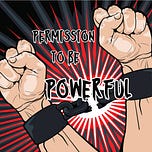Abandoning yourself isn’t loud.
It doesn’t come with warning signs or sirens.
It doesn’t scream for attention.
Instead, it whispers.
👉 It begins quietly— one compromise here…
👉 Another overlooked boundary there…
The whispers become a constant.
So familiar, you don’t even notice…
Self-abandonment is insidious.
👉 It’s turning the other cheek.
👉 It’s agreeing to things you don’t want to do.
👉 It’s tolerating disrespect.
👉 It’s giving too much of yourself.
Self-betrayal is insidious.
Your inner child is keeping score.
When you honor your true feelings…
You’re powerful
And, whenever you don’t…
You alienate yourself.
Every time you abandon yourself,
You betray your thoughts and feelings.
Many people are so out of touch with themselves…
They don’t even know what they feel.
That person needs to be in therapy.
Everyone does.
How did I become Mike Tyson?
Simple—
I put myself first, no matter what.
Sure.
There are some exceptions.
Being a parent means being selfless.
But you must put yourself first.
This is non-negotiable.
Someone who will not allow you to put yourself first disregards a massive part of your humanity.
It’s oppressive. You deserve better.
I lived like this for YEARS...
I thought I was selfless, loving, accommodating, flexible, and good…
But I was disappearing.
Abandoning yourself doesn’t happen all at once.
It’s gradual, like erosion.
It starts with small moments:
👉 Letting someone speak over you…
👉 Deciding not to correct them
👉 Laughing off a hurtful comment…
👉 Saying yes when every you mean no.
I prioritized someone else endlessly.
I’d tell myself it was temporary, just this one time.
But it never was.
It became a habit, a pattern, a way of life.
I wasn’t a person but a reflection of what everyone else wanted me to be.
I let others’ needs dictate my life.
Each time I gave up a piece of myself, I told myself it didn’t matter, that it wasn’t a big deal.
But it was.
You don’t say no...
👉 Even when you want to.
👉 Even when you need to,
👉 Even when you give until you’re empty.
You suppress your feelings.
You tell yourself it’s not worth bringing up, that you’re overreacting, or that it’s easier to let it go.
You avoid confrontation.
Because keeping the peace feels safer than risking rejection or disapproval.
You neglect yourself.
Push aside your desires and goals.
Then you feel resentful.
Over time, all those compromises start to weigh on you, and resentment builds.
Fear is at the root of self-abandonment—fear of rejection, disapproval, and loneliness.
We learn early on that love and acceptance are conditional.
Children are taught to be “obedient”.
Those lessons stuck.
For me, growing up in a volatile household meant constantly managing my father’s moods.
I learned to be hyper-vigilant, anticipating his anger and adjusting my behavior to keep the peace.
It was survival.
But what worked in childhood became my prison in adulthood.
I kept quiet when I should’ve spoken up.
I stayed when I should’ve walked away.
The cost of abandoning yourself is STEEP.
👉 It’s losing your voice and forgetting what it sounds like.
👉 It’s looking in the mirror and not recognizing the person staring back at you.
👉 It’s resentment—toward others, but primarily toward yourself.
I carried that resentment for years.
I resented the people who took advantage of me, but I resented myself even more for letting them.
It wasn’t until I hit rock bottom—emotionally drained and spiritually bankrupt—that I realized I had to change.
How to Reclaim Yourself
Reclaiming yourself isn’t easy. It’s uncomfortable. It feels selfish at first. But it’s necessary.
👉 Step 1: Start Saying No. No explanations. No apologies. Just no.
👉 Step 2: Prioritize Your Needs. What do you want? What do you need? Make those things a priority.
👉 Step 3: Speak Up. Even when it’s uncomfortable. Even when your voice shakes.
👉 Step 4: Set Boundaries. And enforce them. Boundaries are about teaching people how to treat you—and teaching yourself what you will and won’t tolerate.
👉 Step 5: Forgive Yourself. For all the times you abandoned yourself in the past.
You were doing the best you could.
The transition from self-abandonment to self-respect feels seismic.
It’s not just about what you do differently—it’s about who you become.
I stopped being The Chauffeur and started driving my own life.
I started saying no, even when it hurt.
I stopped apologizing for taking up space. And I began to trust myself again.
The people who benefited from my self-abandonment didn’t like the change.
I started showing up differently in relationships, attracting different kinds of people who respected me because I respected myself.
Without hesitation, I became the kind of person who could say, "I count."
Until next time,
Anton
Dancer, Writer, Buddhist.












Share this post